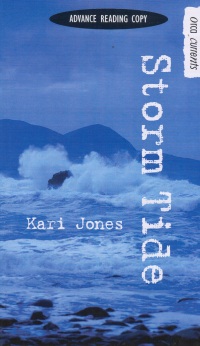| ________________
CM . . . . Volume XVII Number 22. . . .February 11, 2011. 
 |
Storm Tide. (Orca Currents).
Kari Jones.
Victoria, BC: Orca, 2011.
106 pp., pbk. & hc., $9.95 (pbk.), $16.95 (hc.).
ISBN 978-1-55469-807-3 (pbk.),
ISBN 978-1-55469-808-0 (hc.).
Grades 5-8 / Ages 10-13.
Review by Yahong Chi.
**½ /4
Reviewed from Advance Reading Copy.
|
| |
|

excerpt:
Ellen grabs a compass and binoculars from the shelf.
I run to the bathroom and snatch a couple of towels.
Then we're out the door and running down the path to the boat. As we get there, Ellen shouts, "The boat's gone!"
I spin around, but it is nowhere to be seen.
Then I see it in the water with Joseph rowing it. "He's going toward the headland," I shout. Ellen has obviously figured that out too, because she's running as fast as she can towards the light tower. I quickly catch up with her and the two of us hurtle over the headland. We keep to the trees. The last thing we want is for the crazy man to see us.
As part of "Orca Currents," Orca's hi-lo series for middle-grade readers, this book definitely fits. The action moves at a decent pace, and the vocabulary is suitably kept simple. Overall Storm Tide is a quick, decent read, although the book's title is lacking originality and relevance.
Twelve-year-old Simon and his sister Ellen are alone on Discovery Island, their home, for the very first time. His parents have gone to shore to convince the government not to close down their lighthouse station, and Simon's looking forward to a day of doing whatever he wants. Once he's done the chores Ellen is going to make him do, of course. But Simon's day doesn't quite follow plans once he finds a disappearing tent (which doesn't sit well with his sister, who's convinced he's making things up), along with footprints. Ellen finally believes that he's serious when they sight a human head out in the water, and then they haul a real live person out of the sea. The man's nearly drowned, quite delusional, and bent on finding a treasure of some kind. With a stanza from a poem and a crude map as their only clues, Simon and Ellen work together to figure out why this man is hunting for treasure, and what the treasure could possibly be.
The brother-sister relationship between Simon and Ellen is rightly used as tension to its full extent, but the novel reads too quickly for us to actually believe the two have reconciled their differences by the end. It is unclear whether Ellen is older or younger than Simon, a fact that would have aided the family image. As well, a lengthier resolution involving their parents (and a coast guard member named Mark, whose role in the novel is, it seems, only to deliver backstory information at the end) would have rounded out the family's image to the reader. Simon's first-person voice occasionally lacks the contractions which informal language contains, but it is generally believable.
The end result of the treasure idea is neither riches, such as gold or jewels, nor an intangible thing, such as hope or truth, but a compromise: a semi-valuable object where the value lies in its history, not its monetary worth. Information about tides and Juan de Fuca (an European explorer for whom the Juan de Fuca Strait and the Juan de Fuca plate are named after) is inserted carefully and without intrusion and provides an enriched reading experience.
Recommended.
Yahong Chi is a freelancer and blogger in Ottawa, ON.

To comment on this title or this review, send mail to
cm@umanitoba.ca.
Copyright © the Manitoba Library Association. Reproduction for personal use is permitted only if this copyright notice is maintained. Any other reproduction is prohibited without permission.
NEXT REVIEW |
TABLE OF CONTENTS FOR THIS ISSUE- February 11, 2011.
AUTHORS |
TITLES |
MEDIA REVIEWS |
PROFILES |
BACK ISSUES |
SEARCH |
CMARCHIVE |
HOME |
